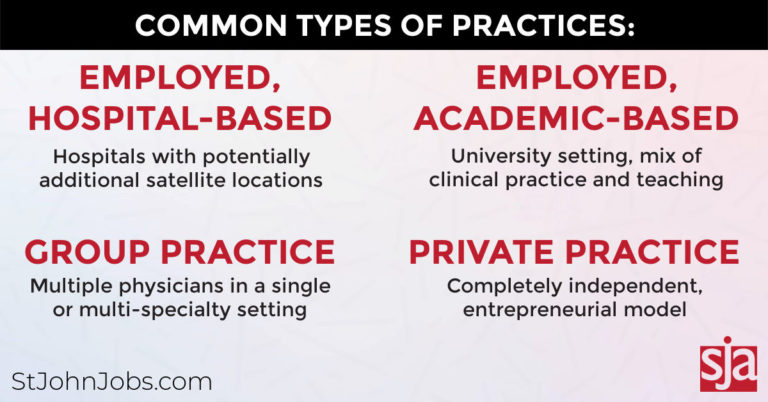
You may be finishing your residency, completing your last year of a subspecialty fellowship, or ready to move on after many years of experience in your current practice. No matter the situation, if you are ready to start your job search, you should consider what type of practice will best align with your personal preferences and long-term professional goals.
The consultants at SJA are knowledgeable about the most common types of practices in healthcare, their advantages, and their disadvantages. We know that the type of medical practice you select will have a lasting impact on your career and, ultimately, your life. Here are some quick facts about the four most common types of medical practices:

Employed, Hospital-based Facility:
Some hospitals purchase and manage existing practices with offices on the hospital campus or nearby where physicians work from both locations. Hospitals will also directly hire physicians to work from the primary inpatient facility and/or their satellite clinics.
Pros:
- Predictable income and work schedules
- Regular patient base and solid referral network
- Less liability, lower risk for legal complications
- Often opportunities for education and training, depending on academic affiliation
- More resources for technology, staff, etc.
- Less administrative burden
- You can focus on practicing medicine
Cons:
- Not as much freedom/autonomy about productivity expectations, policies, procedures
- Requirement to meet specific hospital standards
- Potential expectation to become involved in hospital committee work
- May experience lack of connection with patients
Employed, Academic-Based Institution:
Academic institutions offer a mix of clinical practice with teaching medical students, residents, fellows, and preparing grand rounds cases. In a university setting, salaries are usually capped, meaning you will likely earn the same amount after five to ten years, while your peers in non-academic practices will be making much more.
Pros:
- Benefits are excellent – PTO, retirement, health plans, etc.
- Opportunities to take on new roles and responsibilities
- High potential to be on the cutting edge of technology and use advanced skills
- Care for the most challenging patients, diagnose and treat rare medical conditions
- Participate in clinical research trials and advance medicine
- Work alongside residents and medical students, teach the next generation
- Your colleagues will be some of the best in their fields
Cons:
- Salaries will be lower on average compared to other practice types
- Possibility that there would not be protected time for clinical duties
- Expect to have less control of decisions that affect your department and how you practice.
Group Practice:
Within group practices, you will find single-specialty and multi-specialty facilities. Groups with physicians who practice different specialties benefit from the opportunity to collaborate and refer patients. Single-specialty groups are cohesive and make quick decisions as a group. For both options, sharing call, covering vacations, and scheduling may be easier. Income may also be higher due to less overhead than at a hospital.
Pros:
- Increased financial security
- Better control of lifestyle
- Reliable referral, consults, access to other specialists
- Larger groups have the resources to manage administrative tasks
- More flexibility in scheduling when it comes to covering call, nights, weekends
- Smaller groups may have more autonomy and decision-making ability
- Partnership opportunities
- Lower startup costs
- Ability to work with like-minded colleagues in a community setting
- Continuity in practice – your patients can see your colleagues for their other medical needs
Cons:
- Productivity demands impact compensation
- Partnership deals and overhead allotments can be complicated
- Competition over patients in a group where physicians have similar subspecialties
Private Practice:
There are many benefits a private practice can offer that traditional hospital systems cannot match. Self-employed practice models can provide a more rewarding experience for physicians and this greatly enhances the quality of care their patients receive. This option is most appealing to those who want to engage in decision-making and self-governance.
Pros:
- Enjoy complete professional autonomy, make decisions about how you want to practice
- Ability to hire your own clinical and front desk staff, set the company culture
- Opportunity to learn about business strategy and facility management
- Established practices will have large patient bases, which means more financial incentives
- Deliver higher quality care at a lower medical cost
- Less potential for burnout due to flexible working hours
- Patients enjoy being able to see the same physician for each follow-up visit
Cons:
- Lack of scheduling flexibility or coverage
- Inability to subspecialize
- Income may be less due to budgeting for staff salaries and overhead expenses
- Greater risk for financial instability if the business is not performing well
- May have responsibilities in accounting, administrative tasks, IT, and HR
- Must have an entrepreneurial mindset to build your patient base
Other Practice Considerations:
If you’re undergoing a fellowship to complete your education, you might have even more factors to consider when selecting the type of medical practice you would like to join. For example, if you’re an orthopedic surgeon, you can additionally choose from:
- General Orthopedics – physicians that work with a broad range of conditions
- Multispecialty Orthopedics Practice – a group of physicians who each specialize in a different subspecialty and work together in a collegial atmosphere
- Specialized Practice – a practice that focuses solely on a subspecialty, such as foot and ankle, spine, total joint, etc.
- Sports Medicine Practice – physicians who specialize in injuries incurred during exercise or engaging in sports
Like any major decision, this can be an exciting or stressful time, depending on how you approach it and how prepared you are. Remember: at the end of the day, job satisfaction is driven more by the group’s culture and working environment.
Let SJA help you find the right medical practice to enjoy for many years to come.
"*" indicates required fieldsGet Jobs in Your Specialty Sent to Your Inbox